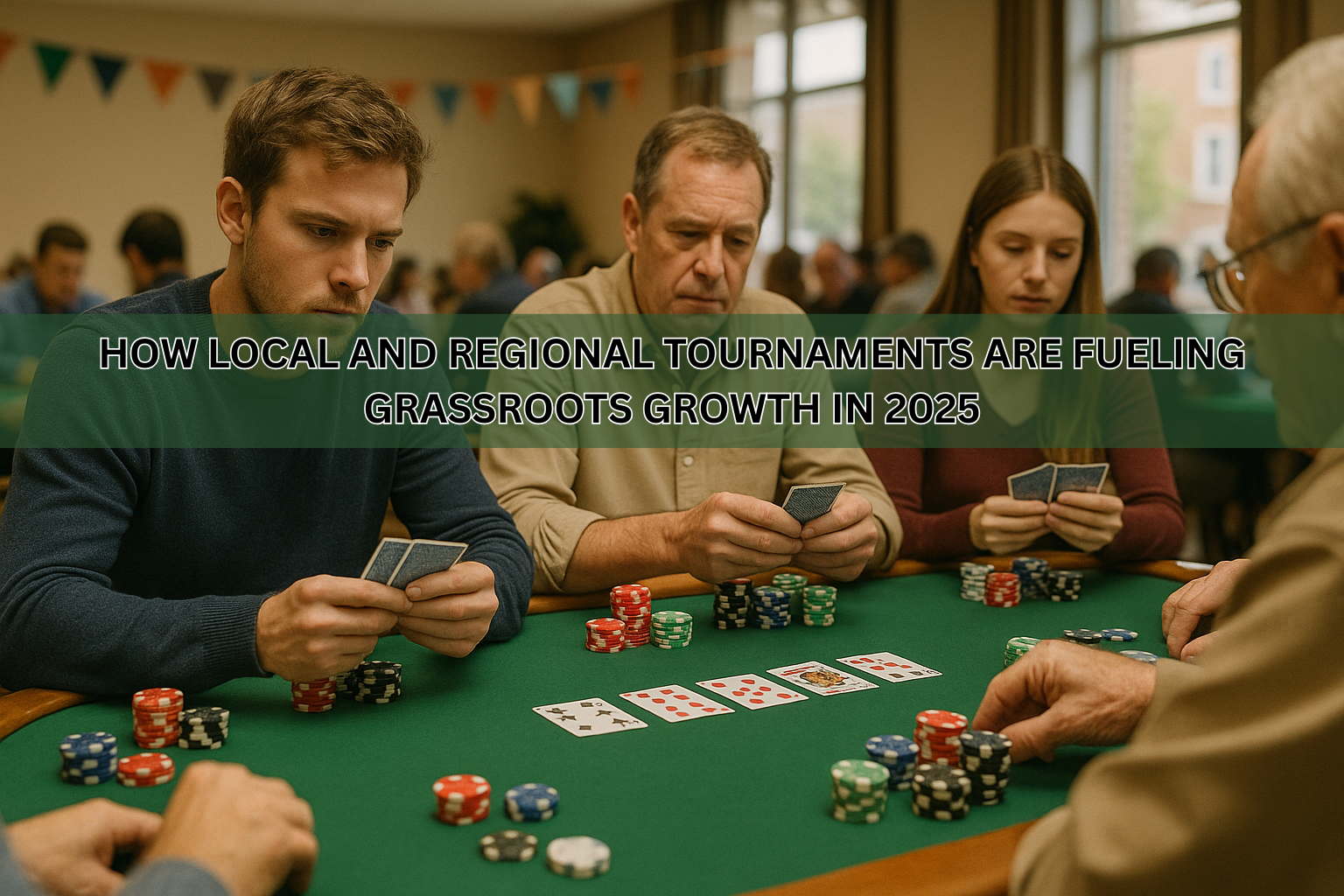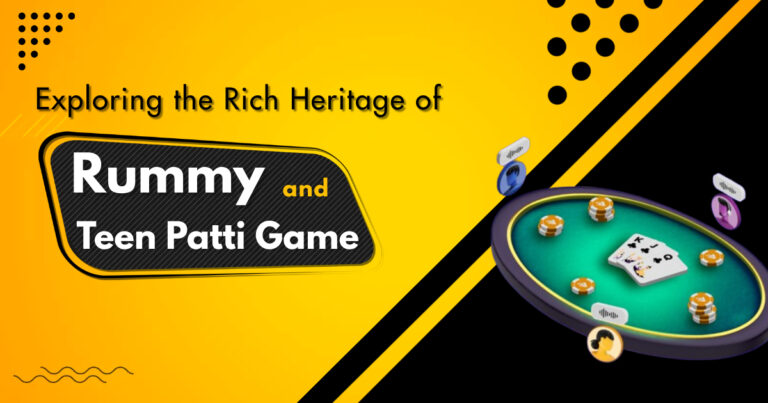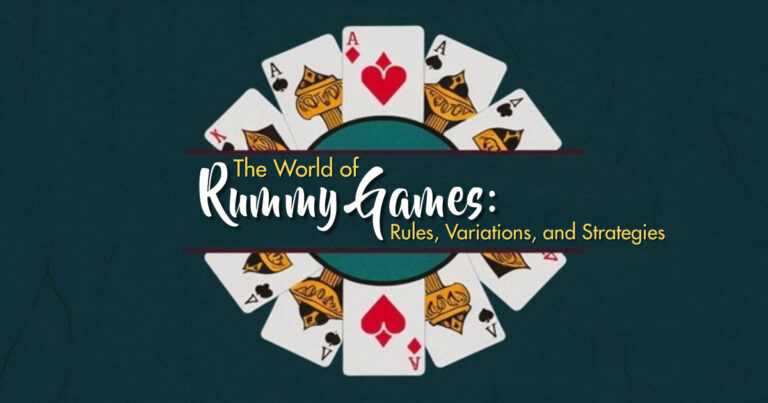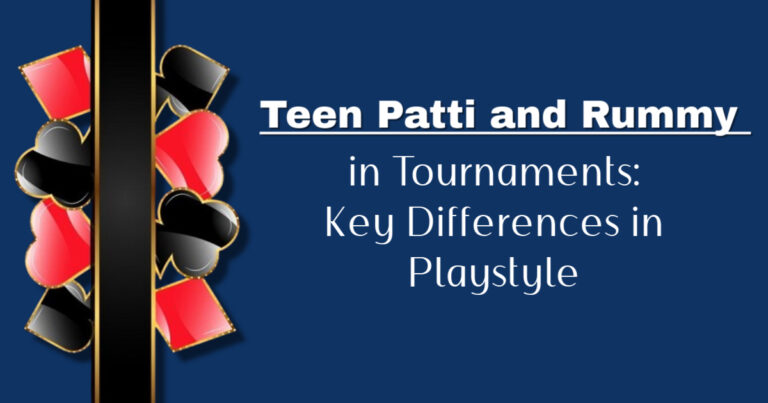How Local and Regional Tournaments Are Fueling Grassroots Growth in 2025
In 2025, poker and other competitive mind games are experiencing a remarkable resurgence—not in the glitzy, million-dollar televised arenas, but on a smaller, more personal scale. Local and regional tournaments in Rummy games are quietly shaping the future of the game, creating strong community ties, developing new talent, and feeding into national and international competitions. While the allure of global events like the World Series of Poker or the Asian Poker Tour remains, the grassroots level is where the heart of the game beats strongest.
This trend isn’t just a nostalgic nod to “smaller games.” It’s a structural shift that’s changing the way players learn, compete, and build careers. Let’s break down why 2025 is proving to be a golden year for local and regional tournaments—and how they’re fueling grassroots growth.

1. The Community Connection
Local and regional tournaments foster a sense of belonging that’s hard to replicate in massive international events. Players don’t just show up to win—they show up to connect. Whether it’s a weekly poker series in a small-town card room or a regional poker championship in a mid-sized city, these events bring together people from the same area who share a love for the game.
In 2025, community engagement has become a major driver of participation. Tournament organizers are leaning heavily on social media groups, local influencers, and club-based loyalty programs to keep players coming back. The result is a feedback loop: players promote events to friends, friends join, and the scene grows organically.
2. A Training Ground for Future Stars
If you look at the player bios of 2025’s breakout poker stars, you’ll notice a common thread—they all cut their teeth in local or regional events. These smaller tournaments offer an ideal training ground: the stakes are lower, the field is more diverse, and players have a chance to build their skills without the intimidating glare of a TV camera.
Regional events in poker in 2025 often feature mixed formats, such as short-deck, bounty tournaments, or hybrid live/online structures, giving players valuable experience in multiple styles. By the time these players step onto the national stage, they’ve already logged hundreds of hours of competitive play, making them more resilient and adaptable.
3. Accessibility and Affordability
One of the biggest barriers to entry for competitive poker is cost. Flights, hotel stays, and big buy-ins can be prohibitive. Local and regional tournaments remove those hurdles. Players can drive to a nearby venue, pay a modest entry fee, and still compete for meaningful prizes.
In 2025, more organizers are offering tiered buy-ins—meaning a single event can have multiple entry points with proportional prize pools. This inclusivity allows beginners, recreational players, and semi-professionals to share the same tables, each competing at their comfort level.
4. Regional Identity and Pride
Poker isn’t just about individual wins; it’s about representing your home turf. In 2025, many regional series of poker are embracing “team formats” or city-vs-city matchups, creating storylines that engage audiences beyond the table. Fans root for their local heroes, follow regional leaderboards, and even travel to nearby cities to support their players.
This spirit of regional rivalry helps sustain interest year-round. Much like how minor league baseball feeds into the major leagues, these tournaments give fans a reason to stay invested in the growth of the game locally.
5. The Digital Boost
The rise of affordable streaming equipment and accessible broadcasting platforms in 2025 means that even a modest regional event can look like a professional production. Local card rooms now stream final tables on Twitch, YouTube, and Facebook Live, complete with commentary and graphics.
Not only does this attract more viewers—it creates an archive of games for players to study. The exposure also draws sponsorship opportunities for both players and venues, helping fund bigger and better events in the future.

6. The Hybrid Format Advantage
One of the most significant innovations in 2025 is the seamless integration of live and online play in regional tournaments. Some events start online, narrowing down the field before bringing the top players to a physical venue for the final rounds. Others allow remote participation in early stages, reducing travel costs and time commitments.
This hybrid approach has two big benefits:
- Expanded reach – Players from smaller towns can join without the need to relocate or travel frequently.
- Retention of live magic – The in-person finals still deliver the excitement, energy, and social interaction that make poker special.
7. Sponsorship and Local Economy Boost
Regional tournaments aren’t just good for the game—they’re good for local economies. Hotels, restaurants, and entertainment venues benefit from the influx of players and fans. In 2025, more local businesses are stepping in as sponsors, providing prize contributions, merchandise, or marketing support.
For the businesses, it’s an easy win: their brand gets exposure, and they’re seen as supporting community events. For the tournaments, it means more resources for better prize pools, improved venues, and enhanced player experiences.
8. Building a Sustainable Player Base
The health of any competitive scene depends on a steady flow of new participants. Local and regional tournaments are crucial here. They’re less intimidating than big events and offer more frequent opportunities to play. In many cases, newcomers first get involved through charity tournaments, pub poker nights, or small club events—then graduate to more competitive circuits.
Organizers in 2025 are actively nurturing this pipeline, offering beginner-friendly formats, free training workshops, and even “mentorship tables” where experienced players guide newcomers through live play.
9. Regional Circuits Feeding National Championships
In 2025, several major poker organizations have established regional qualifier systems. Win (or place highly) in a regional event, and you earn a discounted or free entry to a national championship. This feeder system ensures that top national events feature a mix of seasoned pros and fresh talent from the grassroots level.
This structure also gives regional players something bigger to aim for, keeping them engaged season after season.
10. Cultural Diversity in the Game
Poker might be a universal language, but each region brings its own twist. In India, Teen Patti Stars-style variants are influencing regional tournament formats. In Latin America, community-driven events often pair poker with local festivals. In parts of Europe, short-deck and mixed games are becoming more prominent at the regional level.
These cultural influences enrich the global poker scene. Players who start in their local style often carry that distinct approach to international competitions, making the game more dynamic and unpredictable.
The Road Ahead
The grassroots boom in 2025 is more than just a passing phase—it’s a structural realignment in the competitive gaming world. Local and regional poker tournaments are not only producing tomorrow’s stars, but they’re also preserving the soul of the game in an era dominated by big-money spectacles and online grind sessions.
As technology continues to blur the lines between local and global play, expect to see these smaller circuits grow even more interconnected. By the end of the decade, it’s likely that some of the most iconic champions will trace their origins not to glittering casinos or massive online series, but to the modest, tightly-knit events that lit the first spark.
Final Thought:
If 2025 has taught us anything, it’s that you don’t need a multi-million-dollar prize pool to change the face of poker. Sometimes, all it takes is a few tables, a shared passion, and a community that believes in the game. From neighborhood halls to regional arenas, the grassroots movement is not just alive—it’s thriving. And the players rising from it are proving that the journey from local hero to world champion is still one of the most compelling stories in the game.








